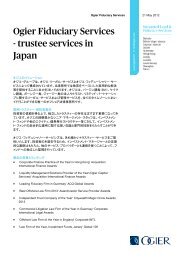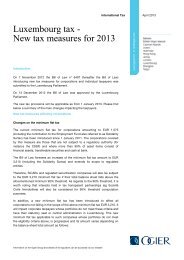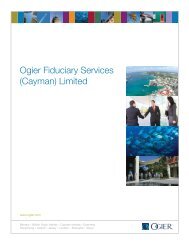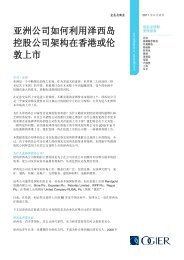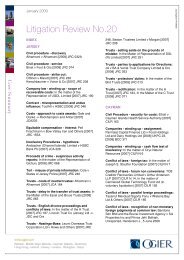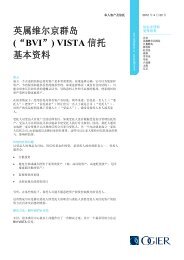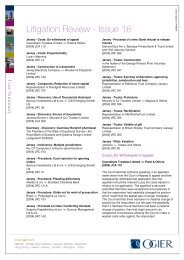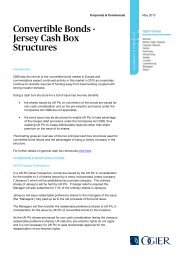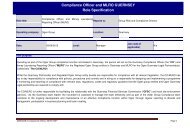Litigation Review - No. 19 - Ogier
Litigation Review - No. 19 - Ogier
Litigation Review - No. 19 - Ogier
Create successful ePaper yourself
Turn your PDF publications into a flip-book with our unique Google optimized e-Paper software.
April 2008<strong>Litigation</strong> <strong>Review</strong> - <strong>No</strong>. <strong>19</strong>Jersey/<strong>Litigation</strong>/14369297Case SummaryINDEXJERSEYCompanies - Application to rectify shareregisterIn the Matter of Representation of Thayer Group Limited[2006] JRC 125BCompanies - Recognition of foreignprovisional liquidatorTacon v Nautilus Trust Company Limited & Ors [2007]JRC 107Companies - Reduction of Share CapitalIn the matter of the Representation of Henderson FarEast Income Limited [2007] JRC 015Contract - discounted damagesSnell v Beadle [2006] JCA 164Costs - contempt of courtPlay Ltd v Legato Assets Ltd [2006] JRC 144Costs - position of public bodiesJFSC v AP Black & Ors [2006] JRC 182Disclosure- <strong>No</strong>rwich PharmacalMacdoel Investments Limited v the Federal Republic ofBrazil & Ors [2007] JCA 069Jurisdiction and forum non conveniensBall v King [2006] JRC 143Ball v King [2006] JRC 171Jaiswal v Jaiswal [2007] JCA 117ALeave to appeal - on costsBritannia Building Society v Milborn [2007] JRC 001Leave to appeal - the test generallyChartier v States of Jersey Post [2007] JRC 008APRESCRIPTIONPell Frischmann Engineering Limited v Bow Valley IranLimited & Ors [2007] JRC 105AStrike Out - DelayLescroel v Le Vesconte [2007] JRC 091Strike Out - no reasonable cause ofaction/frivolous or vexatious/abuse ofprocessTrant v A.G. [2006] JRC 172Trusts - foreign orders re Jersey trustsIn the matter of the B Trust [2006] JRC 185Trusts - handover of trust documents onretirement<strong>Ogier</strong> Trustees Limited v CI Law Trustees Limited & Ors[2006] JRC 158Trusts - recognition of English constructivetrustsPlane v Jones [2006] JCA 127Trusts - removal of trusteeEiro v Equinox Trustees Limited [2006] JRC 1<strong>19</strong>Trusts - variationIn the matter of the Bruno Sangle-Ferrier Children’sSettlement [2006] JRC <strong>19</strong>3GUERNSEYFreezing Injunction: disclosure orderGarnet Investments Ltd v BNP Paribas (Suisse) SA,Royal Court, 23 May 2007Implements new Royal Court Civil RulesPeremption - Applicable prescription periodfor an action - Building disputeSingleton v Duncan, Royal Court, 24 April 2007
April 2008<strong>Litigation</strong> <strong>Review</strong> - <strong>No</strong>. <strong>19</strong>Procedure: judge making factual findingsalone; JurisdictionFidelity Management Limited v Royal Bank of Canada(Channel Islands) Limited, Royal Court, 20 September2007Utility Regulation - 3G Licence - Jurisdictionof the Utility Appeals TribunalCable and Wireless Guernsey Ltd v Director General ofOffice of Utility Regulation, Royal Court, 24 May 2007Trusts: appointment and removal of trustprotectorIn the Matter of the Circle Trust - HSBC InternationalTrustee Limited v. Wong & Others [2006 CILR 323]Trusts: forfeiture clausesA.N. v. Barclays Private Bank and Trust (Cayman)Limited & Others [2006 CILR 367]JERSEY CASESCase SummaryCAYMANCivil Procedure - Role of appellate CourtSmith and Quarry Products v. Harris [2006 CILR N24]Companies: Compulsory Winding Up -“Creditors”In the matter of Parmalat Capital Finance Limited [2006CILR 48]Conflicts: Enforcement of ForeignJudgementsMiller .v. Gianne & Redwood Hotel InvestmentCorporation [2007] CILR 18Conflicts: Foreign Tax ClaimsWahr-Hansen, Anders Jahre Rederi AS & Anor. .v.Compass Trust Company Limited and Others [2007 CILR55]Conflict of Laws: recognition of foreignproceedingsIn the Matter of Univest Multi-Strategy Fund II Limited[2006 CILR 452]Privy Council : Procedure: Intervention byJudgeDemarco Almeida .v. CVC/Opportunity Equity PartnersLimited [2006 CILR 430]Procedure: Letters of RequestUnited States District Court’s Request [2007 CILRN.2]Procedure: Security for CostsTasarruf Mevduati Sigorta Fonu .v. Wisteria Bay Limited,Utterton Limited, Al-Ayed and Registrar of Shipping [2006CILR 3510]Companies - Application to rectify shareregisterIn the Matter of Representation of ThayerGroup Limited [2006] JRC 125BThis was the first case in which the provisions of Article47 of the Companies (Jersey) Law <strong>19</strong>91, which governthe circumstances in which a company can apply torectify its share register, came up for consideration.The Royal Court held that the Article was clearly basedupon similar provisions in the English companieslegislation and it extracted the following principles fromEnglish authority, which it then applied to the facts.• The jurisdiction to rectify the register of a company is tobe widely construed.• The Court has a discretion as to whether or not to grantrectification even where satisfied that there are groundsfor making such an order.• Rectification may be retrospective, i.e. to take effect asfrom the date upon which the correct entry should havebeen made, but the Court may refuse to do this where itwould prejudice the rights of third parties.These principles were subsequently applied by theDeputy Bailiff in In the matter of Level One Holding(Jersey) Limited, Royal Court, 1 June 2007, [2007]JRC106Companies - Recognition of foreignprovisional liquidatorTacon v Nautilus Trust Company Limited &Ors [2007] JRC 107The Royal Court recognised the status of a provisionalliquidator appointed under BVI law even though theconcept of a provisional liquidator is not part of Jerseylaw.ADMIN-14369297-2
April 2008<strong>Litigation</strong> <strong>Review</strong> - <strong>No</strong>. <strong>19</strong>Case SummaryCompanies - Reduction of Share CapitalIn the matter of the Representation ofHenderson Far East Income Limited [2007]JRC 015A closed end collective investment fund company soughtto reduce its share capital pursuant to Articles 62 and 63of the Companies (Jersey) Law <strong>19</strong>91. The court held thatit had a discretion as to whether to approve a reduction ofcapital approved by the shareholders by specialresolution and in considering its decision it had to look atthe interests of the shareholders (to ensure that they havebeen treated equitably, the proposals have been properlyexplained to them and that the reduction has adiscernable purpose).The purpose of the reduction was twofold. The firstpurpose was to ensure the company’s ability to pay aquarterly dividend even if capital or other losses wereaccrued in the future which would otherwise prevent itspayment. The second was to ensure that if its shareswere traded at a discount to their net asset value (asoften happens with closed ended investment companies),the company could effect a buy-back of its shares fromtime to time (funded out of distributable profits) in order toameliorate the discount position. The issue of no parvalue shares would be followed by an immediatereduction of capital to enable distributions to be madefollowed by an issue of shares to the public. The courtwas satisfied that there was a discernible purpose andthat the proposals for the reduction had been properlyexplained in the prospectus, but it emphasised the needfor companies to explain in simple lay terms why thereduction is thought to be a good idea for shareholders.As far as the interests of the creditors were concerned,they were protected by the retention by the company of asum of money which would not be distributed until afterthey had been paid in full. The court therefore approvedthe reduction of capital.was therefore justified - in accordance with the principlesset out in Allied Maples Group Ltd v Simmons & Simmons[<strong>19</strong>95] 1 WLR 1602 -in applying a discount to reflect thatuncertainty.Costs - contempt of courtPlay Ltd v Legato Assets Ltd [2006] JRC144The important point which emerges from this case is thatwhere a defendant breaches an interim injunction so as tocommit a contempt of court, he will be ordered to payindemnity costs even if the breach was inadvertent. Themain reason for this is that a plaintiff should not be left outof pocket in seeking to obtain enforcement of the relief hehad already been granted by the Court.Costs - position of public bodiesJFSC v AP Black & Ors [2006] JRC 182Commissioner Page was faced with an argument thatfollowing the strike-out of proceedings brought by theJFSC against one of the defendants, she should bear herown costs.He reviewed the relevant English authorities and held thathe was not prepared to follow authority to the effect thatbodies engaged in performing public interest functionsmust in all cases take their chance on costs, just like anyother litigant, stating that such a rigid position was at oddswith the general approach of the Royal Court to theexercise of discretion in matter of costs. The fact that theunsuccessful or discontinuing party has been engaged inthe proceedings in furtherance of its public interestfunction was a relevant factor but should be treated asonly one element relevant to the court’s exercise ofdiscretion. The body’s status should not be treated asautomatically giving rise to any rule that it should not paycosts.Contract - discounted damagesSnell v Beadle [2006] JCA 164This case concerned Mr. Snell’s appeal against the RoyalCourt’s decision on the quantum of his damages forbreach of contract. The contract comprised anagreement between himself and Mrs. Beadle that hewould have a right of way across her land, from whichshe subsequently resiled.The Court of Appeal upheld the Royal Court’s decision toapply a 25% discount to the recoverable damagesbecause Mr. Snell’s ability to develop two properties(which he alleged he would have done, had Mrs. Beadleupheld her end of the agreement) would have beendependent on funding provided by others. His loss,therefore, depended upon the hypothetical act of a thirdparty. The Royal Court thought that funding wouldprobably have been available but was not sure, and itThe correct approach is to consider both: (i) the financialprejudice to the particular complainant if an order forcosts is not made in his favour; and (ii) the need toencourage public authorities to make and stand by honestand reasonable decisions without fear of exposure toundue prejudice if the decision is successfully challenged.Taking these factors into account, he found that thedefendant’s unwillingness to verify her means by affidavitfor the purposes of claiming legal aid counted against her(had she done so, the JFSC would probably havedropped the proceedings against her) and ordered thatshe should bear her own costs. He also ordered that theJFSC could discontinue the proceedings with no furtherorder as to costs.ADMIN-14369297-2
April 2008<strong>Litigation</strong> <strong>Review</strong> - <strong>No</strong>. <strong>19</strong>Case SummaryDisclosure - <strong>No</strong>rwich PharmacalMacdoel Investments Limited v the FederalRepublic of Brazil & Ors [2007] JCA 069The Federal Republic of Brazil sought disclosure ofcertain documents in connection with the investigation ofcivil fraud claims against Paolo Maluf and others. Theallegations against Mr. Maluf involved conspiracy,corruption, embezzlement of public funds and moneylaundering, in connection with two major public worksprojects that were undertaken in Sao Paolo when Mr.Maluf was mayor. It was alleged that the price of theworks was fraudulently inflated and the excess, runninginto hundreds of millions of US dollars, was diverted intothe hands of Mr. Maluf and/or individuals or entitiesassociated with him, including members of his family, viabank accounts in Switzerland and Jersey. The FederalRepublic of Brazil convened various banks as defendantsand sought disclosure from them of documentationrelating to accounts held by them in the names of theappellants and certain other individuals and entities,including Mr. Maluf.The Royal Court ordered disclosure in the terms soughtand the appellants appealed that order on the ground thatthe <strong>No</strong>rwich Pharmacal jurisdiction did not provide a legalbasis for the type of disclosure ordered and the evidencewas insufficiently strong to warrant disclosure under theBankers Trust jurisdiction. The second ground of appealwas that if the Royal Court had the power to orderdisclosure, it erred in the exercise of its discretion in doingso and that the Federal Republic had no sufficient interestto bring the proceedings under Jersey law.The Court reviewed all the relevant UK authorities on<strong>No</strong>rwich Pharmacal and Bankers Trust relief, dismissedthe appeal and enunciated the following importantprinciples.• Where disclosure is sought from a defendant who isalleged to have become innocently mixed up inwrongdoing, the determinative question in any particularcase is whether justice requires discovery to be ordered.This means that the availability of <strong>No</strong>rwich Pharmacalrelief is not limited to cases where it is necessary toidentify the wrongdoer, but it also extends tocircumstances where, e.g., to determine the location ofembezzled funds or the methodology of the fraud.• The <strong>No</strong>rwich Pharmacal jurisdiction is not necessarilyrestricted to cases in which the facts are similar and inapplying it, the Jersey courts will have regard to,amongst other things, the policy considerations whichshape the law of Jersey and the social and economiccontext in which it operates. A relevant factor is that theJersey courts are conscious that Jersey’s reputation asa major financial centre might suffer if it were not willingto assist victims of wrongdoing to obtain redress.• Against that background, the test was whether the RoyalCourt was satisfied: (i) that the respondents were thevictims of wrongdoing and (ii) that the banks hadADMIN-14369297-2become mixed up in the wrongdoing. The threshold forthe Royal Court being satisfied that a defendant hasbecome mixed up in alleged wrongdoing, so as to owethe plaintiff a duty of disclosure may be stated asfollows. Disclosure will only be ordered if there is noother source of information that will assist the personwronged. It is not unjust that a duty to disclose existwhere the court is satisfied that there is a reasonablesuspicion that the third party has been mixed up in thewrongdoing. Something less than prima facie evidenceof wrongdoing is sufficient and there is no reason torequire a higher threshold.Jurisdiction and forum non conveniensBall v King [2006] JRC 143The case concerned the circumstances in which theCourt could retrospectively grant an extension of time fortaking the formal steps necessary to start a jurisdictionchallenge. Rule 6/7(3)(a)(ii) of the Royal Court Rulesprovides that an application must be made to the Bailiff’sJudicial Secretary to fix a date for the hearing of thechallenge to the jurisdiction within 28 days after the actiongoes onto the Pending List, which starts the pleadingstimetable running.In this case, the summons disputing jurisdiction wasissued in time by the Defendant, but it was mistakenlyissued before the Master rather than the Bailiff and thePlaintiff’s advocate did not take the point. The summonswas subsequently adjourned by consent and eventuallywhen it came on for hearing the parties realised that theMaster had no jurisdiction. The Defendant then soughtleave to issue a summons out of time.The Court found that the interests of justice dictated thatleave should be granted because:• There had been a clear intention from the very start tochallenge the jurisdiction and this was not a case wherethere had been a change of stance by one party.• It was a mutual error and as soon as the error came tolight, the Defendant’s advocate moved with appropriateurgency and speed.• The delay caused by the challenge to the jurisdictionwould be suffered in any event and the extra delaycaused by the Defendant having issued the summonsbefore the wrong part of the Court would only extend to1-2 months. For this reason, the level of prejudicecaused to the Plaintiff did not outweigh the interests ofjustice in allowing the Defendant to continue with achallenge to the jurisdiction, which he was always goingto bring.• The judge could not form any view as to the merits, buthe did not consider that the challenge to the jurisdictionwas obviously hopeless (had it been, he would havetaken this into account in reaching his decision).
April 2008<strong>Litigation</strong> <strong>Review</strong> - <strong>No</strong>. <strong>19</strong>Ball v King [2006] JRC 171Leave to appeal - on costsCase SummaryThe Royal Court then heard the application of Mr. King,who was a Jersey resident (and therefore was served asof right in Jersey), to stay the proceedings broughtagainst him on the grounds of forum non conveniens.The Court applied Spiliada principles and held that theapproach in cases where a defendant is sued in Jerseyas of right is that a stay should only be granted where theCourt is satisfied that there is some other available forumwhich is the appropriate or natural forum for trial of theaction. Where a plaintiff sues as of right, the burden restsupon the defendant to show not just that Jersey is not thenatural or appropriate forum but to establish that there isanother available forum which is clearly or distinctly moreappropriate than Jersey. If the Court is satisfied thatthere is such a forum, it will ordinarily grant a stay unlessthe plaintiff can prove that there are circumstances byreason of which justice requires that a stay shouldnevertheless not be granted.Although the Court had considerable sympathy for thePlaintiff’s position, it concluded that England was clearlyand distinctly the more appropriate forum for the action.The dispute was ultimately concerned with an agreementbetween an English resident and a Jersey resident, veryprobably governed by English law, concerning Englishreal property and whether there had been amisrepresentation concerning the planning permissionattached to such property. Apart from the Defendant, thePlaintiff and all the witnesses were likely to be resident inEngland and the meaning of English planningpermissions might be in issue. The only connection withJersey was that the Defendant lived there. The Courtplaced minimal weight upon the existence of the Englishproceedings, which were started by the Defendant onlydays before the Jersey proceedings and sought only anegative declaration.Jaiswal v Jaiswal [2007] JCA 117AThis case centred on a dispute between three brothers asto the validity of the will of their late father, who had dieddomiciled in India but whose testate estate was situatedlargely in Jersey.The case turned largely on its facts but the Court ofAppeal’s judgment is important in so far as it held that ifone of the brothers, who was arguing that the disputeshould be tried in India instead of Jersey, had dropped hisguard and taken a step in the Jersey proceedings so asto submit to the jurisdiction, this would not prevent himfrom contending that another forum (i.e. India) was moreappropriate. At most, it would prevent him fromcontending that the Royal Court was not an appropriate(or at any rate an available) forum. The Court of Appealdistinguished the case from Solvalub v MatchInvestments Ltd (<strong>19</strong>96) JLR 361, where the Respondenthad asked for positive relief by way of counterclaim andwas properly held no longer able to contest thejurisdiction of the Royal Court.Britannia Building Society v Milborn [2007]JRC 001Page, Commr, reviewed the authorities on the test forleave to appeal and stated that:• The leading statement of the circumstances in whichleave to appeal will be granted is that of the Court ofAppeal in Glazebrook v Housing Committee [2002] JCA217.• Where the application is for leave to appeal on costs, inconsidering whether something has clearly gone wrongor in considering the second and third Glazebrookgrounds, regard must be had to:(a) the well established, limited grounds on which theCourt of Appeal will interfere with the exercise ofdiscretion by the Court below; and(b) the principle that where costs are at issue theapplicant should have the benefit of any doubt as towhether there is a realistic prospect of success, butwhere the Court is satisfied that there is no suchprospect it has a duty to refuse leave.Leave to appeal - the test generallyChartier v States of Jersey Post [2007] JRC008AThe Court endorsed the test for leave to appeal as set outin Glazebrook v Housing Committee [2002] JCA 217, asfollows. Leave to appeal will be granted in any of thefollowing circumstances.• There is a clear case of something having gone wrongin the court below.• The case involves a question of general principle,decided for the first time.• The case involves an important question of law, uponwhich further argument and a decision of the Court ofAppeal would be to the public advantage.The Court referred to the fact that the test had changed inEngland and Wales, such that leave will normally begranted unless the grounds of appeal have no realisticprospect of success. The Court considered BritanniaBuilding Society v Milborn [2007] JRC001 but found thatcase to be concerned with an appeal on costs, whereasGlazebrook was a case on substance. In any event, itheld that there was clear evidence of something havinggone wrong in the court below in the instant case, so thatthe (higher) Glazebrook test was satisfied.ADMIN-14369297-2
April 2008<strong>Litigation</strong> <strong>Review</strong> - <strong>No</strong>. <strong>19</strong>Case SummaryPrescriptionPell Frischmann Engineering Limited v BowValley Iran Limited & Ors [2007] JRC 105AThis case is the first in which the Royal Court dealt withissues of limitation in relation to the cause of action ofbreach of confidence and offered a view as to whetherthe equitable doctrine of laches applies in Jersey.The Court held that issues of limitation are treated asbeing procedural under Jersey and English law andtherefore governed by the lex fori (in this case, Jerseylaw). It went on to clarify the law on limitation in relationto actions for breach of confidence in Jersey, holding thatthe limitation period for such a cause of action is tenyears.The Court also accepted that the doctrine of laches or itsequivalent could operate in Jersey so that in certaincircumstances, a plaintiff may be refused some particularform of relief notwithstanding that his claim is not timebarred,but declined to express any precise formulation ofthe principle (as it had not been fully argued).Strike Out - DelayLescroel v Le Vesconte [2007] JRC 091Rule 6/26(13) provides that if two months have elapsedfrom the time limited for filing pleadings and no summonsfor directions has been issued, the Court may, of its ownvolition, having given not less than 28 days notice inwriting to all parties, order the dismissal of the action.The Court held that when considering whether to dismissan action pursuant to this rule, the Master shouldconsider the following.• Has the plaintiff satisfied him that, apart from the failureto issue a summons for directions as required by Rule6/26, he (including his advisers) has prosecuted hiscase with at least reasonable diligence, so that overallhe is innocent of any significant failure to conduct thecase with expedition?• Has the plaintiff satisfied him that, in all thecircumstances, his failure to apply for a summons fordirections is excusable and should be forgiven?• Has the plaintiff satisfied him that the balance of justiceindicates that the action should be allowed to continue?If the answer to any of these three questions is no, thiswill point towards dismissal of the action.As the Royal Court Rules are currently drafted, a decisiontaken by the Master to dismiss an action under Rule6/12(13) is a judicial act even in those cases where nosummons in response to the circular has been issued bythe plaintiff with the consequence that the Master hadheard no argument on the question of whether the actionshould be permitted to continue. This means that anADMIN-14369297-2appeal to the Court is currently the only available route forthe strike out to be reviewed. The Court held that thiswas undesirable and necessitated a change in the Rules.Strike Out - no reasonable cause ofaction/frivolous or vexatious/abuse ofprocessTrant v A.G. [2006] JRC 172The Attorney General made an application to strike outthe order of justice of the plaintiffs pursuant to Rule6/13(1)(a) and/or (b) and/or (d) of the Royal Court Rules(as amended) on the grounds that it disclosed noreasonable cause of action, was frivolous or vexations orotherwise an abuse of process. The plaintiffs soughtdeclaratory relief to the effect that inter alia they could notbe compelled to attend or give evidence in and couldvalidly claim the privilege against self-incrimination inrespect of criminal proceedings in Jersey which had beencommenced by the Attorney General against two otherparties who were accused of laundering money resultingfrom the criminal conduct of the plaintiffs.The court emphasised that on an application to strike outon the ground that there is no reasonable cause of actionevidence is not admissible, whereas on an applicationbased on the ground that the order of justice isscandalous, frivolous or vexatious or an abuse of processor where the application to strike out is made out underthe inherent jurisdiction of the court, evidence isadmissible and may be considered by the court.It struck out all claims made in the order of justice otherthan the plaintiffs’ claim that the statements obtained fromthem were obtained unlawfully as a result ofmisrepresentation on behalf of those representing theAttorney General and that, as a result, they had a claimagainst the Attorney General for misuse of privateinformation, breach of confidence and/or abuse of power.It did so even though the plaintiffs had failed to put inevidence dealing with this key aspect of the claim.Trusts - foreign orders re Jersey trustsIn the matter of the B Trust [2006] JRC 185This decision was the first decision of the Royal Court inrelation to the new Article 9 of the Trusts (Jersey) Law<strong>19</strong>84 (as amended) (“the TJL”). The trustees of the BTrust applied to the Royal Court for directions in relationto the administration of the B Trust following an order ofthe Family Division of the High Court in England inmatrimonial proceedings between two beneficiaries of thetrust, varying the terms of the trust as a post-nuptialsettlement in the wife’s favour. The trustee had submittedto the jurisdiction in the English proceedings and it soughtdirections as to how it should respond to the Englishorder.The trustee argued that the Court should give effect to theEnglish order. The husband resisted this on two grounds:
April 2008<strong>Litigation</strong> <strong>Review</strong> - <strong>No</strong>. <strong>19</strong>Case Summaryfirst, he submitted that the effect of Article 9 (asamended) was to render the English order unenforceableon the basis that the finding that the B Trust was a postnuptialsettlement was inconsistent with Jersey law.Secondly, he argued that the jurisdiction to enforce aforeign judgment on the basis of comity had beenremoved on a proper interpretation of the new Article9(4), which provided that no foreign judgment withrespect to a trust would be enforceable to the extent thatit was inconsistent with the TJL irrespective of anyapplicable law relating to conflicts of law.The Court rejected both arguments of the husband. Itinclined to the view that the B Trust was not a post-nuptialsettlement under Jersey law but found that in the contextof the provisions of the B Trust, it was clear that questionsrelating to the exercise of the trustee’s powers ofadministration and appointment were to be governed byEnglish law. It was not concerned with the questionwhether the B Trust was a post-nuptial settlement, norwas it being asked to vary the trusts of the B Trust. It wassimply exercising a jurisdiction under Article 51 of the TJLto give directions to a trustee which had sought theassistance of the court. Its function was to decidewhether and if so, to what extent, to give effect to theconclusions at which the English court arrived and indoing so, it would apply Jersey law.should be the normal costs order in a case where atrustee fails in its fiduciary duty in this way, so that theloss should not fall on the beneficiaries.Trusts - recognition of English constructivetrustsPlane v Jones [2006] JCA 127This case involved a claim by a beneficiary of a trust foran order that the trust fund be distributed and terminatedas to part, to reflect her claim that she had in fact held abeneficial interest in three properties prior to theirsettlement into the trust by her partner.The Court of Appeal considered the nature of the interestthe claimant had in the properties as a matter of Englishlaw (as the trust property was located in England) andconfirmed, following English authority (Lloyds BankLimited v Rosset [<strong>19</strong>91] 1 AC 107 and Grant v Edwards[<strong>19</strong>86] Ch 638) that a constructive trust in property mayarise where there was express agreement of the relevantparties and an act by the claiming party to its detriment,or alternatively, where a common intention can beinferred by conduct (which would typically arise wherethere had been a contribution to the purchase price orpayment of mortgage instalments).The Court also rejected the argument that a properinterpretation of Article 9(4) dispensed with the jurisdictionto enforce a foreign judgment on the basis of comity. TheBailiff held that although the meaning of Article 9(3)(which provides that the law of Jersey relating to … (b)conflicts of law shall not apply to the determination of anyquestion mentioned in paragraph (1) [including, e.g. theadministration by a trustee of a trust] unless the settlorwas domiciled in Jersey), when read in conjunction withArticle 9(4), was unclear, he was quite sure that neitherparagraph excluded the application of the doctrine ofcomity, which was after all simply a question of goodjudicial manners.In exercising its discretion under Article 51 of the TJL, theCourt had regard to the interests of all the beneficiaries ofthe B Trust and decided to give effect to the Englishorder.Trusts - handover of trust documents onretirement<strong>Ogier</strong> Trustees Limited v CI Law TrusteesLimited & Ors [2006] JRC 158In circumstances where the defendant, as outgoingtrustee, had failed to provide a full and proper handoverof trust documents to enable the incoming trustee toidentify and gather in the assets of the trust,notwithstanding that the documents were eventuallyprovided, the failure to provide documents by way of atimely handover would amount to a breach of fiduciaryduty and indemnity costs were awarded against theoutgoing trustee. The Deputy Bailiff commented that thisTrusts - removal of trusteeEiro v Equinox Trustees Limited [2006] JRC1<strong>19</strong>One set of beneficiaries applied to remove the Defendantas trustee of a trust on the ground that they had lost faithin the trustee and that it had behaved incompetently tosuch an extent that its removal from office was justified.The Court held that the legal test for the removal of atrustee was the same as that under English law: thegeneral principle guiding the court in the exercise of itsjurisdiction is the welfare of the beneficiaries and thecompetent administration of the trust in their favour.Although positive misconduct will always justify theremoval of the trustee who has abused his trust, it is notevery mistake or neglect of duty or inaccuracy of conducton the part of the trustee which will do so: subject to thegeneral guiding principle the act or omission must besuch as to endanger the trust property or to show a wantof honesty, or a want of proper capacity to execute theduties, or a want of reasonable fidelity.The allegations of incompetence on the facts amountedto a suggestion that during a certain period the Defendanthad not taken sufficiently active steps to remedy thedefects of administration on the part of their predecessor.However, the evidence showed that in fact the Defendanthad taken steps to investigate and remedy the defects atits own expense (as the trust had no liquid assets). Thus,the Court was satisfied that the Defendant had performedits duties competently.ADMIN-14369297-2
April 2008<strong>Litigation</strong> <strong>Review</strong> - <strong>No</strong>. <strong>19</strong>Trusts - variationImplements new Royal Court Civil RulesCase SummaryIn the matter of the Bruno Sangle-FerrierChildren’s Settlement [2006] JRC <strong>19</strong>3This concerned an application by the trustees of theBruno Sangle-Ferrier Children’s Settlement seeking theCourt’s approval to the variation of certain provisions ofthe Settlement. The variations were designed to allow forfiscal savings (which were supported by the guardian adlitem for the minor and unborn beneficiaries) and includedinter alia the provision of a power to add beneficiaries.Although in one sense the power to increase thebeneficial class could be said to be contrary to theinterests of the children of the settlor in so far as it couldbe increased potentially to their detriment, the power toadd beneficiaries was subject to the consent of theprotector and was a quite usual power, whose exercisewas subject to the control of the Court. The Court tookinto account the fact that fiscal savings were an importantconsideration which, if in the interests of all thebeneficiaries, may justify a variation. In light of thesefactors, the Court allowed the variation.GUERNSEY CASESFreezing Injunction: disclosure orderGarnet Investments Ltd v BNP Paribas(Suisse) SA, Royal Court, 23 May 2007An interlocutory freezing order had been obtained by theGovernment of Indonesia in respect of funds held by thePlaintiffs at a Guernsey bank, BNP Paribas (Suisse) SA(“BNP”). The Plaintiffs applied for the freezing order to bedischarged on the basis that the Government ofIndonesia did not have a good arguable case but theRoyal Court disagreed and ruled that the freezing ordershould continue.The Government’s case was that the funds over whichthe freezing order had been obtained were beneficiallyowned by Mr Hutomo Putra, one of the sons of the lateformer ruler of Indonesia, President Soeharto. Mattershad come to a head in 2002 when the Plaintiffs issuedpayment instructions concerning the funds (which hadbeen deposited with BNP in <strong>19</strong>98). BNP refused toaction these instructions because the Guernsey FinancialIntelligence Service refused to consent to the payment.The Court held that the Government of Indonesia had anarguable case against Mr Putra arising out of allegationsof corruption and furthermore that there was a real risk ofdissipation of the Guernsey funds. The Plaintiffs werealso ordered to give disclosure of its financial transactionssince its establishment.On 4 October 2007 it was announced that with effect from4 February 2008 the existing Royal Court Civil Ruleswould be replaced in their entirety by the Royal CourtCivil Rules 2007. The intention behind the new rules wasto simplify, clarify and streamline Guernsey’s civilprocedure and to give litigants and judges more moderntools to enable the courts to deal with cases justly.Here are details of some of the most significant changes.As before, the plaintiff must table a claim document(“cause”) before the Court containing the material factsrelied on and a statement of the relief sought. The plaintiffmust give 2 days’ notice of the intention to table a cause,by serving a summons on the defendant. A new feature ofthe process is that a defendant is required to table hisdefences to the action 28 days after the action is listed onthe Role des Causes a Plaider (such period can beextended by up to 3 months by agreement between theparties).From 4 February 2008 Exceptions de Forme will bedeemed to be a request by a defendant for furtherinformation. The new rules also contain provisionspermitting both plaintiffs and (for the first time) defendantsto apply for summary judgment. There are also newprovisions for interpleader relief and for therepresentation of interested persons whose identity /whereabouts cannot be ascertained. These will bewelcomed in particular where issues before the courtconcern, for example, the estate of a deceased person, atrust or the meaning of a document.The Rules also introduce a number of case managementpowers, including a long non-exhaustive list of casemanagement techniques. It is anticipated that a casemanagement conference will be held in the majority ofcivil cases. For cases proceeding under the new rules,the Court must consider whether the trial is to be heardby a single judge sitting alone or by a judge sitting withJurats. A pre-trial review will take place in most cases.Any party to an action may at any time make a paymentinto the court in satisfaction of any claim against him oroffer to settle the whole or any part of the claim made byor against him in the action. This is Guernsey’s equivalentto Part 36 of the English Civil Procedure Rules.There are changes too to the disclosure regime.Guernsey has adopted a very wide definition of whatconstitutes a “document” and the disclosure procedure isnow more streamlined. In most cases, disclosure ofdocuments will be limited to “standard disclosure”. A dutyto make a reasonable search is imposed upon parties tolitigation and the duty of disclosure remains a continuingone.The Plaintiffs have appealed against the judgment andthe appeal is likely to be heard in March 2008.Finally, for the first time the court has power to make anorder for payment of costs at the conclusion of a hearingor application at any interim stage.ADMIN-14369297-2
April 2008<strong>Litigation</strong> <strong>Review</strong> - <strong>No</strong>. <strong>19</strong>Case SummaryIt is hoped that the new rules will be welcomed byconsumers of the Guernsey legal process and will enablethe court to deal with cases justly.Peremption - Applicable prescription periodfor an action - Building disputeSingleton v Duncan, Royal Court, 24 April2007In this case a doctrine peculiar to Guernsey law was thefocus of attention; the doctrine of ‘peremption’. What is‘peremption’? It is essentially a procedural bar to thecontinuance of a legal process which arises automaticallywhere no action has been taken in that process for aperiod of one year and a day.The claim in this case related to a building dispute valuedat just under £7,000 and which originated in <strong>19</strong>96.Peremption occurred (the action became ‘périmée’) on 30September 2004. At that time there were discussionsabout the possibility of mediation. These discussionswere not fruitful so the plaintiff applied on 17 <strong>No</strong>vember2006 for a trial date to be fixed. The defendant took thepoint that the action had become périmée.The Court noted that there are generally 5 factors to betaken into account:• the position of the plaintiff;• the history of the action which has led to its becomingpérimée ;• the position of the defendant;• any other special circumstances; and• the general circumstances in Guernsey relating to therelevant class of litigation.It was emphasized that this was not an exhaustive listand that when considering an action which had becomepérimée there was always room to accommodate thefacts of a particular case. In this case the application torestore the case to the court list succeeded, the Courtfinding that there were special considerations in this case.These included notably that discussions had beencontinuing about the possibility of mediation at the time ofand indeed subsequent to the action becoming périmée.Procedure: judge making factual findingsalone; JurisdictionFidelity Management Limited v Royal Bankof Canada (Channel Islands) Limited, RoyalCourt, 20 September 2007This case arose out of a suspicious transaction report tothe Financial Intelligence Service in Guernsey (“FIS”).The Court was asked to decide as a preliminary matterwhether or not payment instructions were validly made.There was a suggestion that the issue should be referredto the courts of the Turks and Caicos Islands as a moreappropriate forum but the Court noted that all partiesbefore the Court were content for the Court to exercisejurisdiction and accordingly the Court considered that itwas able to proceed to a determination.Having done so, the Court then required to consider thecircumstances in which a Guernsey judge can makefindings of fact in relation to preliminary issues, in theabsence of jurats (the body of professional jurors whodecide questions of fact). The Court decided that it wasdifficult to establish any settled practice on this point andtherefore declined to list all circumstances in which itwould be appropriate for a judge to sit alone to determinepreliminary issues. However, the Court did indicate that itwould be appropriate where there were no conflicts ofinterest and no questions of credibility to be considered.On the facts the declaration sought was granted and theFIS is now expected to indicate whether it will issue orrefuse consent to the instructed transfer.Utility Regulation - 3G Licence - Jurisdictionof the Utility Appeals TribunalCable and Wireless Guernsey Ltd v DirectorGeneral of Office of Utility Regulation,Royal Court, 24 May 2007In this case a restrictive analysis of the jurisdiction of theUtility Appeals Tribunal (“UAT”) in Guernsey was adoptedby the Royal Court. Cable and Wireless GuernseyLimited (“CWG”) had submitted a bid to the Office ofUtility Regulation in Guernsey (the “OUR”) seeking thegrant of a 3G licence to operate 3G services in Guernsey.The application was unsuccessful and CWG appealedagainst the OUR’s decision to the UAT. The time limit forfiling all necessary appeal documents under the relevantprimary legislation was tight (and indeed the time limitwas subsequently extended by amending legislation inrecognition of this) and CWG sought an extension of timefrom the UAT.The Royal Court ruled that under the primary legislationthe UAT did not have the power to extend the time limit.The result of this decision was that the appeal was anullity from the outset because the appeal process onlykicked off when an appeal was filed which met the criteriaset out in the primary legislation. Although the rules ofprocedure of the UAT indicated that the UAT could largelydetermine its own procedure, as secondary legislationthese rules could not be used to override time limits setout in the primary legislation.Furthermore, when the extension of time was granted theUAT had not technically come into existence as nomembers had been appointed. It followed that anypurported exercise of the UAT’s powers was null andvoid.ADMIN-14369297-2
April 2008<strong>Litigation</strong> <strong>Review</strong> - <strong>No</strong>. <strong>19</strong>Case SummaryThe decision on this reference demonstrates a rigorousapproach to the exercise of powers by statutory bodiesand highlights the extreme commercial importance ofensuring that all steps taken fall strictly within the letter ofthat body’s statutory powers.CAYMAN CASESCivil Procedure - Role of appellate CourtSmith and Quarry Products v. Harris [2006CILR N24]The Judicial Committee of the Privy Council held that theBoard of the Judicial Committee will generally decline toreview decisions on factual matters when a trial judge andan appellate court have reached the same conclusions(Bekoe v. Broomes [2005] UKPC 39, at paras. 10-12,followed).Companies: Compulsory Winding Up -“Creditors”In the matter of Parmalat Capital FinanceLimited [2006 CILR 48]Food Holdings Limited and Dairy Holdings Limited(together “FDH”) brought a Petition for the winding up ofParmalat Capital Finance Limited, a Brazilian subsidiaryof the Parmalat Group (“PCFL”), and confirmation of thejoint provisional liquidators as official liquidators.FDH were SPVs which acquired their shares in PCFLsubject to a put agreement under which PCFL wouldpurchase the shares if a put event occurred. Put eventsoccurred in <strong>No</strong>vember of 2003 and PCFL became liableto pay a base option price to FDH.FDH retained legal title but as part of the securityagreement, the right to receive payment was transferredto a security trustee who would pay out in accordancewith priorities set out in the agreement. Any surpluswould be paid to FDH, but at the time of the proceedingsit seemed unlikely that any surplus would remain. Othercreditors opposed the appointment of the JPLS as jointofficial liquidators and wanted their own choice ofliquidator appointed. It was also argued against FDH thatthey had no standing to petition for winding up as the rightto be treated as creditors had been transferred to thesecurity trustee. It was also argued that no considerationhad been given for the put agreements and thereforeFDH could not be treated as creditors.The Grand Court granted FDH’s application and theappellants appealed to the Court of Appeal. It was heldthat FDH were creditors within Section 96 of theCompanies Law (2004 Revision) as they retained legaltitle and were entitled to any surplus - even if it wasunlikely that any surplus would in fact exist. The Court ofAppeal stated that if it were only creditors who expectedto receive payment out of the assets of a liquidation thatwere able to petition, companies with no assets would beprotected from any petition made against them; thiscannot have been the intention of the law makers.The Court of Appeal also held that if there was substantialdispute as to whether an individual was a creditor not, theCourt would usually dismiss the Petition but the Court hada discretion to allow creditors whose claim was disputedto petition if to order otherwise would deprive thepetitioners of a remedy, or if there was another reasonwhy the petition should proceed.Conflicts: Enforcement of ForeignJudgementsMiller .v. Gianne & Redwood HotelInvestment Corporation [2007] CILR 18The Grand Court (Smellie, C.J.), held, in the context of anapplication by the Plaintiff for leave to amend theStatement of Claim to seek recognition of a Los Angelesstipulated Judgment which did not constitute a Judgmentfor a definite sum of money, that such a Judgment wouldbe capable of enforcement at common law in the CaymanIslands, notwithstanding the well-established common lawrule in Sadler v. Robins (1808) 1 Camp.253 that anessential element for such enforcement is that theJudgment is for a definite sum of money. The Court,following the Privy Counsel in Pattni v. Ali [2007] 2 AC 85,and finding support from the Supreme Court of Canada inPro Swing Inc. v. Elta Golf Inc. [2006] SCR 612, foundthat, in principle, a final and conclusive foreign judgment,but which was not for a definite sum of money, wasnevertheless capable of enforcement at common law.Furthermore, recognition and enforcement of foreign nonmonetaryjudgments probably existed in equity, evenbefore Sadler v. Robins, but had become dormant indeference to what became the traditional common lawrule.<strong>No</strong>te: Cayman Islands jurisdiction has very limitedstatutory reciprocal enforcement arrangements, and thiscase is accordingly of considerable significance, inparticular in the context of foreign orders for specificperformance and declarations.Conflicts: Foreign Tax ClaimsWahr-Hansen, Anders Jahre Rederi AS &Anor. .v. Compass Trust Company Limitedand Others [2007 CILR 55]The Grand Court (Henderson, J) in rejecting anapplication to dismiss an action to trace trusts assets inCayman as an attempt by a foreign government to collecttax, held, after a detailed review of the relevantauthorities, that there were three essential elements of a“tax-gathering defence”. First, there has to be anunsatisfied tax claim. Secondly, the entire proceeds ofthe litigation has to go to the foreign revenue authority,since the rule is intended to prevent a state fromasserting its authority within the territory of another,whereas a claim initiated to benefit ordinary creditorsADMIN-14369297-2
April 2008<strong>Litigation</strong> <strong>Review</strong> - <strong>No</strong>. <strong>19</strong>Case Summarycould not seen as an extension of a sovereign power.Thirdly, a claim must be, in substance, an attempt tocollect foreign tax. The Court has to consider not theform, but the substance, of the proceedings, and will notentertain a claim that involves, even indirectly, theenforcement of a foreign revenue law, even though theclaim might be wholly private in nature. The Courtrejected the contention that there were other essentialelements of a tax gathering defence: once it is shown thatthe proceedings are in substance an attempt to enforce aforeign revenue law, there is no need to prove aconnection between the claim and that law. The rule isnot restricted to dispute between a tax payer and a taxingauthority; it can be used by and against third parties andto defeat proprietary claims. In determining whether theclaim is, in substance, an attempt to collect foreign tax,the characteristics of the party invoking the defence andwhether the claim is proprietary in nature, are importantconsiderations.Conflict of Laws: recognition of foreignproceedingsIn the Matter of Univest Multi-Strategy FundII Limited [2006 CILR 452]The applicants applied to the Cayman courts forrecognition as the liquidators of a Minnesotan company,following their appointment as joint provisional liquidators(“JPLs”) by the Supreme Court of the Bahamas (wherethe company had been registered).Held, dismissing the application: The Cayman courtswould not recognise the JPLs, as they were onlyprovisional, rather than official liquidators, and even thentheir appointment had been challenged in the Bahamas.Furthermore, the company’s place of incorporation wasMinnesota, not the Bahamas, and no evidence had beenadduced to show that the JPLs would be accepted asliquidators in Minnesota.Privy Council : Procedure: Intervention byJudgeDemarco Almeida .v. CVC/OpportunityEquity Partners Limited [2006 CILR 430]The respondent had brought a claim for the return of a“signing bonus” which had been paid to a formeremployee prior to the commencement of employment.The terms of the bonus were that half would be paidinitially and half would be tied up in a mutual fundmanaged by the respondent. The respondent allegedthat the employee had been dismissed for badperformance. The ex-employee threatened to petition forthe winding up of the Company. The Grand Court heldthat “bad performance” was too vague to be contractuallyenforceable and that the employee was entitled to thewhole bonus and the shares he had been promised in theCompany.During the trial the Judge had intervened to question thewitnesses and on appeal it was argued that the Judgehad lost the appearance of impartiality and seemed tohave given an inadequate consideration of the evidence.The Court of Appeal directed there be a new trial.The Privy Counsel upheld the Grand Court’s decisionsaying that there was no reason to suppose that a fairminded and informed observer would conclude that therehad been a real possibility of bias on the part of theJudge.It was also held that “bad performance” was not toovague a term but that no evidence had been submittedthat the employee was in fact dismissed for badperformance.The Privy Council stated that the guidelines to befollowed in considering the propriety of a Judge’sintervention during proceedings were aimed atascertaining whether the intervention had created a realdanger that the trial was unfair. It was necessary todistinguish between interventions indicating that theJudge had closed his mind to persuasion and thosesuggesting a provisional opinion which could be alteredby further argument. There is nothing to say that a Judgecould not express displeasure with a deceitful of evasivewitness and the principles should be applied flexiblyaccording to the particular circumstances.Procedure: Letters of RequestUnited States District Court’s Request [2007CILRN.2]The Grand Court (Henderson. J) held that although aCayman Islands Court will not implement a letter ofrequest which has been issued merely for the purpose ofobtaining pre-trial discovery for foreign civil proceedings,the Court will accept a statement in that letter to the effectthat such evidence “is requested for trial”, and the furtherassurances of Counsel that is the true purpose for whichthe evidence is sought. It is immaterial that the foreignproceedings are only at the stage of discovery, when theletter of request is issued. It is no objection toimplementing a letter of request that a witness may, asthe indirect effect of the evidence he gives pursuant tothat letter, makes himself liable to an application fordiscovery or to civil proceedings.Procedure: Security for CostsTasarruf Mevduati Sigorta Fonu .v. WisteriaBay Limited, Utterton Limited, Al-Ayed andRegistrar of Shipping [2006 CILR 3510]TMSF was an agency of the Turkish Government whohad sought an Injunction Order against the Respondentto prevent dealing with two ships which the TMSF had, inexercise of its duties, seized in Cayman. The Injunctionhad been granted but with an error which also preventedTMSF from dealing with the ships. TMSF hadADMIN-14369297-2
April 2008<strong>Litigation</strong> <strong>Review</strong> - <strong>No</strong>. <strong>19</strong>Case Summarynevertheless auctioned one of the ships and the GrandCourt held that it was in contempt and ordered securityfor costs in the amount of $500,000.On appeal, the Court of Appeal held that the initialinjunction had been made in excess of the Grand Court’sjurisdiction as the State of Immunity Act precluded it frompreventing an agency or a foreign government fromcarrying out its governmental duties in its own state.TMSF sought the discharge of the Order and security forcosts on the basis that there had been a material changein circumstances in that the Court of Appeal had decidedthat the Grand Court had no jurisdiction to order theInjunction against TMSF also on the basis that security ofcosts was not usually granted against an agency or aforeign government of international good standing. It wasalso argued that as the breach of the Injunction only tookplace after TMSF had consulted with the Turkish Courtsfor guidance. It was not appropriate to make the orderagainst it.The Court held that the order for security for costs shouldbe discharged as TMSF had been put in a position inwhich it had no choice but to disobey either the CaymanCourts or the Turkish Courts and neglect its governmentalduties. The contempt aside therefore, TMSF should betreated like any other state agency with a goodinternational standing. Funds were available though theTurkish government and therefore no security would beordered. The re-assessment of the security for costsOrder was possible because, although there had been nomaterial change of circumstances in the sense that TMSFstill had no funds in the jurisdiction and had acted incontempt, the Court of Appeal’s decision meant that theInjunction ought not to have been made against TMSF inthe first place. It would be artificial to separate thewrongful making of the Injunction from TMSF’sdisobedience to that Injunction.Trusts: appointment and removal of trustprotectorIn the Matter of the Circle Trust - HSBCInternational Trustee Limited v. Wong &Others [2006 CILR 323]exercised in good faith for the benefit of the trust and allbeneficiaries. The Court was satisfied that: (a) thesettlor’s intent was that the protector was to assume afiduciary role; (b) the right of nomination accorded to thebeneficiaries imposes a fiduciary obligation upon them;and, (c) the answer to the second question was therefore“yes” - the exercise of the power to appoint a protector bya majority of the beneficiaries would be invalid if taintedby (i) irrationality, (ii) absence of good faith, or (iii)impropriety of the majority’s purpose.The Court also held that it has an inherent jurisdiction toremove the protector upon good cause being shown, andto appoint another in his stead.Trusts: forfeiture clausesA.N. v. Barclays Private Bank and Trust(Cayman) Limited & Others [2006 CILR 367]The Plaintiff, a primary discretionary beneficiary of the HIJTrust and the KLM Trust, applied for, inter alia,declarations that clauses 23 of the trusts were invalid andfor the removal of the incumbent trustees. Clause 23 ofeach trust was a forfeiture clause which stated thatbeneficiaries contesting the validity of the trust or thedecisions of the trustee would be “excluded from anybenefits, direct or indirect, deriving from the trust fund.”As a preliminary issue the Court was asked to determinewhether the forfeiture clauses had already operated bydint of the beneficiary’s contest in the proceedings,thereby excluding her from benefit under the trusts.Held: It would be unconscionable for a beneficiary toforfeit her interests simply by challenging any action ofthe trustee, even when he acted capriciously or in badfaith, and a clause purporting to have that effect would becontrary to public policy as an ouster of the jurisdiction ofthe Courts. Accordingly, clause 23 was to be interpretedas reading “whosoever unjustifiably contests the validityof this deed and the trust created under it…” and that forthe purposes of the clause, a justifiable contest would beone which was made bona fide, with probabilis causalitigandi and which was not frivolous or vexatious.The Plaintiff (the trustee of the Circle Trust) applied to theCourt for the preliminary determination of a number ofquestions regarding the beneficiaries’ power to appoint atrust protector. The second of these questions was“would the exercise of the power to appoint a protector bya majority of the beneficiaries be invalid if tainted by (i)irrationality, (ii) absence of good faith, or (iii) improprietyof the majority’s purpose?”.Held: The law requires the power to remove and appointtrustees, even when exercised by beneficiaries, to beexercised in good faith for the benefit of the trust as awhole. In this case, as the protector was afforded thepower to appoint and remove trustees, it followed that theright of nomination of the protector must equally beADMIN-14369297-2
April 2008<strong>Litigation</strong> <strong>Review</strong> - <strong>No</strong>. <strong>19</strong>About <strong>Ogier</strong><strong>Ogier</strong> is an award winning world leader in the provision ofoffshore legal and fiduciary services. Our integrated legaland fiduciary approach has proved a winning combinationwhich enables us to secure awards for the quality of ourservices and our people.Case SummaryThe Group employs over 850 people and provides adviceon all aspects of BVI, Cayman, Guernsey and Jersey lawand fiduciary services through our international spread ofoffices that cover all time zones and key financialmarkets. Our network includes Bahrain, BVI, Cayman,Guernsey, Hong Kong, Ireland, Jersey, London,Shanghai and Tokyo.ADMIN-14369297-2
April 2008<strong>Litigation</strong> <strong>Review</strong> - <strong>No</strong>. <strong>19</strong>Contact detailsNORTH & SOUTH AMERICABritish Virgin IslandsMichael Fay+1 284 494 0525michael.fay@ogier.comEUROPE, MIDDLE EAST & AFRICAGuernseySimon Davies+44 (0) 1481 737175simon.davies@ogier.comCase SummaryCaymanChristopher Russell+1 345 914 1685christopher.russell@ogier.comJerseyKerry Lawrence+44 (0) 1534 504376kerry.lawrence@ogier.comMatthew Thompson+44 (0) 1534 504311matthew.thompson@ogier.comThis client briefing has been prepared for clientsand professional associates of the firm. Theinformation and expressions of opinion which itcontains are not intended to be acomprehensive study or to provide legal adviceand should not be treated as a substitute forspecific advice concerning individual situations.<strong>Ogier</strong> includes separate partnerships whichadvise on BVI, Cayman, Guernsey and Jerseylaw. For a full list of partners please visit ourwebsite.Please check with the relevant contact listedabove for specific details regarding the legalservices we offer from each office as we do notalways practice the law of the jurisdiction whereour offices are located. Please note that thenamed contact may not be qualified to advise onall the laws practiced from that office.



